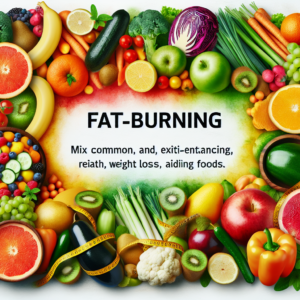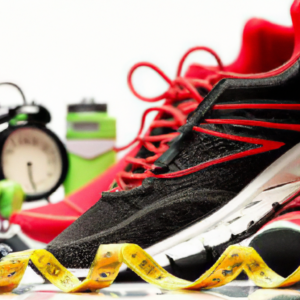Are you over 50 and looking to shed some weight quickly? Look no further! In this article, we will share some effective tips and strategies to help you achieve your weight loss goals. Losing weight can be challenging, especially as we age, but with the right approach and mindset, you can make significant progress towards a healthier and fitter you. Let’s explore the key factors that contribute to weight gain in your 50s and discover practical ways to tackle them head-on. So, are you ready to embark on this weight loss journey? Let’s get started!
Eating Habits
Increase Protein Intake
As you age, it becomes even more essential to increase your protein intake for weight loss and to maintain muscle mass. Protein is crucial for repairing and building tissues, boosting your metabolism, and keeping you feeling satisfied throughout the day. Include lean sources of protein such as chicken, turkey, fish, tofu, legumes, and Greek yogurt in your meals and snacks.
Eat More Fiber
A high-fiber diet can aid weight loss by promoting feelings of fullness and supporting digestive health. Include plenty of fruits, vegetables, whole grains, and legumes in your meals to increase your fiber intake. Foods like apples, berries, oats, broccoli, and lentils are excellent sources of fiber that can help you reach your weight loss goals.
Avoid Processed Foods
Processed foods often contain high amounts of added sugars, unhealthy fats, and preservatives, making them less nutritious and more calorie-dense. Opt for whole, unprocessed foods like fruits, vegetables, whole grains, lean proteins, and nuts. Cooking meals from scratch using fresh ingredients allows you to have full control over the quality and nutritional content of your meals.
Stay Hydrated
Drinking enough water is crucial for overall health and successful weight loss. Water helps to boost your metabolism, reduce cravings, flush out toxins, and keep you feeling energized. Aim to drink at least 8 glasses of water per day and consider incorporating hydrating foods like cucumbers, watermelon, and leafy greens into your meals.
Exercise Routine
Engage in Cardiovascular Activities
Cardiovascular exercises such as brisk walking, cycling, swimming, or dancing are great for burning calories and improving overall cardiovascular health. Aim for at least 150 minutes of moderate-intensity aerobic activity or 75 minutes of vigorous-intensity aerobic activity per week. Choose activities that you enjoy to make it easier to stay consistent.
Incorporate Strength Training
Including strength training exercises in your routine can help build muscle mass, increase your metabolism, and improve body composition. Focus on exercises that target major muscle groups, such as squats, lunges, push-ups, and planks. Start with lighter weights or resistance bands and gradually increase the intensity as you become stronger.
Try Low-Impact Exercises
Low-impact exercises like yoga, Pilates, and swimming are gentle on your joints while still providing numerous health benefits. These exercises can improve flexibility, balance, and core strength. They are particularly beneficial for individuals with existing joint issues or those who prefer a lower intensity workout.
Include Stretching and Flexibility
Stretching and flexibility exercises are essential for maintaining joint health, preventing injuries, and improving overall mobility. Consider incorporating activities like yoga, tai chi, or stretching routines into your exercise routine. Stretching before and after workouts can also help improve your performance and reduce muscle soreness.

Lifestyle Changes
Ensure Adequate Sleep
Getting enough quality sleep is crucial for weight loss and overall health. Lack of sleep can disrupt your hormone levels, increase cravings, and affect your metabolism. Aim for 7-9 hours of uninterrupted sleep each night. Establish a relaxing bedtime routine, create a comfortable sleep environment, and limit caffeine and electronic devices before bed.
Manage Stress Levels
Chronic stress can contribute to weight gain and make it difficult to lose weight. Find stress-management techniques that work for you, such as meditation, deep breathing exercises, yoga, or engaging in hobbies you enjoy. Prioritizing self-care and taking time to relax and unwind can help minimize stress levels and support your weight loss efforts.
Limit Alcohol Consumption
Alcohol is high in calories and can hinder weight loss progress. It is also associated with increased appetite and poor food choices. If you choose to drink alcohol, do so in moderation. Opt for lighter options like a glass of wine or a low-calorie cocktail and be mindful of the number of calories consumed from alcohol.
Quit Smoking
Smoking not only poses numerous health risks but can also hinder your weight loss efforts. Many people turn to food as a substitute for smoking, leading to weight gain. Quitting smoking may be challenging, but it is highly beneficial for your overall health and will improve your chances of successful weight loss.
Portion Control
Listen to Your Body
Understanding and acknowledging your body’s hunger and fullness cues is crucial for portion control. Eat slowly and mindfully, paying attention to how your body feels and stopping when you feel comfortably satisfied. Avoid eating until you are overly full, as this can lead to consuming more calories than necessary.
Use Smaller Plates
Trick your mind into thinking you’re eating more by using smaller plates and bowls. Research shows that people tend to eat less when using smaller dishware, as it creates a visual illusion of a larger portion. This simple trick can help you control your portion sizes and prevent overeating.
Avoid Eating Out of Packages
Eating directly out of packages can lead to mindless eating and make it challenging to monitor portion sizes. Instead, serve yourself a portion on a plate or in a bowl. This allows you to see how much you’re eating and better gauge your hunger and satisfaction levels.
Practice Mindful Eating
Mindful eating involves paying full attention to the present moment while eating, without distractions. By focusing on the taste, texture, and satisfaction of each bite, you can become more attuned to your body’s hunger and fullness signals. This practice helps prevent overeating and encourages a healthier relationship with food.

Meal Planning
Prepare Healthy Snacks
By having healthy snacks readily available, you can avoid reaching for unhealthy options when hunger strikes. Prepare pre-portioned snacks like cut-up fruits, vegetables with hummus, Greek yogurt, or a handful of nuts. Having these snacks on hand will make it easier to make healthier choices throughout the day.
Cook at Home
Cooking your meals at home gives you full control over ingredients and portion sizes, making it easier to make healthier choices. Experiment with new recipes, try different cooking methods, and enjoy the process of preparing nourishing meals. Planning your meals for the week and batch cooking can save time and ensure you have nutritious meals available even on busy days.
Include Fruits and Vegetables
Fruits and vegetables are not only low in calories but also packed with essential vitamins, minerals, and fiber. Aim to include a variety of colorful fruits and vegetables in your meals to ensure you’re getting a wide range of nutrients. Try incorporating them into dishes, smoothies, salads, or as side dishes to boost your overall nutrient intake.
Limit Added Sugars
Added sugars can contribute to weight gain and increase the risk of chronic diseases. Be mindful of the amount of sugar you consume by reading food labels and choosing products with no or limited added sugars. Opt for natural sweeteners like honey or maple syrup, and focus on satisfying your sweet tooth with whole fruits.
Intermittent Fasting
Choose a Suitable Fasting Protocol
Intermittent fasting is an eating pattern that cycles between periods of fasting and eating. There are several fasting protocols to choose from, such as the 16/8 method or alternate day fasting. Select a fasting protocol that aligns with your lifestyle and preferences, ensuring it is sustainable for long-term adherence.
Gradually Increase Fasting Hours
Start with a shorter fasting period and gradually increase it over time to allow your body to adapt. This gradual approach can help minimize potential side effects and make the fasting experience more manageable. Listen to your body and adjust the fasting hours based on how it feels for you.
Stay Hydrated During Fasts
While fasting, it’s crucial to stay hydrated by drinking an adequate amount of water. Water helps curb hunger, supports the body’s natural detoxification processes, and promotes overall well-being. You can also enjoy unsweetened herbal tea or black coffee during fasting periods, but be cautious with caffeine intake and its potential effects on sleep and hydration.
Consult a Doctor
Before starting any fasting regimen, it is recommended to consult with a healthcare professional, especially if you have underlying medical conditions or take medications. They can provide personalized advice and help determine if intermittent fasting is suitable for you based on your individual health needs.
Hydration
Drink Sufficient Water
Staying properly hydrated is essential for weight loss and overall health. Aim to drink at least 8 cups (64 ounces) of water per day. If you engage in intense physical activity or live in a hot climate, you may need to increase your water intake. Carry a refillable water bottle with you throughout the day to help track your water consumption.
Limit Sugary Beverages
Sugar-sweetened beverages like soda, fruit juices, and sports drinks can add unnecessary calories and hinder weight loss efforts. Opt for healthier alternatives like water, herbal tea, or infused water with fruits for added flavor. If you crave fizzy drinks, consider switching to sparkling water or flavored seltzers.
Avoid Excessive Caffeine
While moderate caffeine consumption can offer some benefits, excessive intake can have negative effects on your hydration levels, sleep quality, and overall health. Limit your caffeine intake and be mindful of its sources, such as coffee, tea, energy drinks, and certain medications. Opt for decaffeinated versions or herbal alternatives for better hydration.
Include Hydrating Foods
In addition to drinking water, you can boost your hydration by including hydrating foods in your diet. Foods like cucumbers, watermelon, oranges, strawberries, and leafy greens have high water content and can help meet your hydration needs. Consider incorporating these foods into your meals and snacks to stay well-hydrated.
Track Your Progress
Set Achievable Goals
Setting realistic and achievable goals is key to staying motivated and tracking your progress effectively. Break down your weight loss journey into smaller milestones, whether it’s losing a certain amount of weight, inches off your waistline, or being able to perform a specific exercise. Celebrating these achievements along the way will help keep you motivated.
Keep a Food and Exercise Journal
Keeping a journal can help you become more aware of your eating habits, track your calorie intake, and identify any patterns or triggers for overeating. Additionally, tracking your exercise routine and progress can provide valuable insights into your fitness journey. Write down your meals, snacks, and workouts to hold yourself accountable and make adjustments as needed.
Monitor Body Measurements
In addition to weighing yourself, taking regular body measurements can provide a more accurate picture of your progress. Measure your waist, hips, thighs, and arms using a tape measure and track changes over time. Sometimes the scale may not reflect actual fat loss, but changes in measurements can indicate improvements in body composition.
Celebrate Milestones
Celebrate your achievements along the way to keep your motivation high. Reward yourself with non-food-related treats when you reach a milestone or achieve a goal. Treat yourself to a massage, a new workout outfit, a relaxing spa day, or a day off. Recognize and appreciate the hard work and dedication you have put into your weight loss journey.
Supplementation
Consult a Healthcare Professional
Before starting any supplementation regimen, it’s crucial to consult with a healthcare professional, especially if you have underlying medical conditions or take medications. They can help determine if you have any nutrient deficiencies and guide you on suitable supplements based on your individual needs and health status.
Consider Essential Nutrients
Certain nutrients may be beneficial to support weight loss and overall health. These include omega-3 fatty acids, vitamin D, magnesium, and probiotics. However, it’s best to get these nutrients from whole foods whenever possible. If you struggle to meet your nutritional needs through diet alone, supplements may be considered under the guidance of a healthcare professional.
Explore Natural Supplements
There are numerous natural supplements on the market that claim to aid weight loss. However, it’s important to approach them with caution and do thorough research. Some natural supplements, such as green tea extract or konjac root, may have some evidence supporting their effectiveness. Always consult with a healthcare professional before trying any new supplements.
Be Aware of Potential Risks
While supplements can be beneficial, it’s crucial to be aware of potential risks and interactions with medications. Some supplements may have side effects, contraindications, or interact with certain medications. Fully disclose your supplement use to your healthcare professional to ensure their safety and effectiveness in conjunction with your weight loss efforts.
Accountability
Find a Weight Loss Buddy
Having a weight loss buddy can provide support, accountability, and motivation throughout your journey. Find someone with similar goals who can join you in activities like exercising, meal prepping, or discussing challenges and successes. Celebrate each other’s achievements and provide a source of encouragement when faced with setbacks.
Join a Support Group
Joining a weight loss support group, either in-person or online, can provide a sense of community and understanding. Sharing experiences, tips, and struggles with like-minded individuals who are facing similar challenges can make the weight loss journey feel less lonely. Support groups also offer a platform to gain new insights and knowledge from others who have successfully lost weight.
Use Technology and Apps
Take advantage of technology and fitness apps to aid your weight loss journey. There are various apps available that can help track your food intake, count calories, monitor exercise, set reminders, and offer motivation. These tools can help you stay on track, provide valuable insights, and make the weight loss process more enjoyable.
Reward Yourself
Don’t forget to reward yourself for your hard work and progress. Rewards can provide an added incentive to stay committed to your weight loss goals. Reward yourself with non-food-related treats such as a new outfit, a massage, a day trip to your favorite location, or a relaxing spa day. Celebrate your achievements and recognize the effort you put into your journey.
Remember, weight loss is a journey that requires patience, consistency, and individualized approaches. Incorporating these strategies into your lifestyle can help you lose weight quickly and maintain a healthy lifestyle well beyond your 50s. Listen to your body, be kind to yourself, and enjoy the process of becoming a healthier and happier version of yourself.






